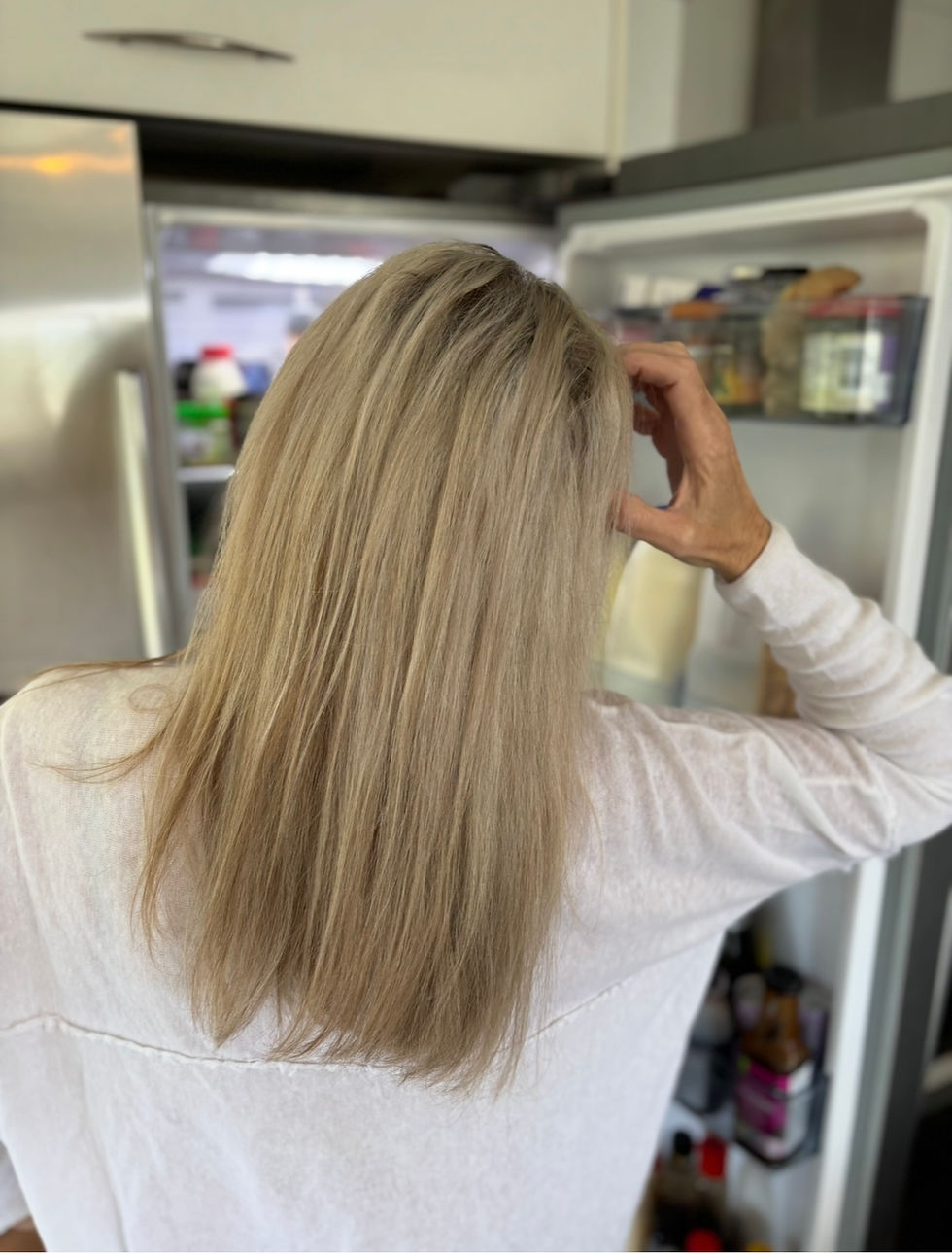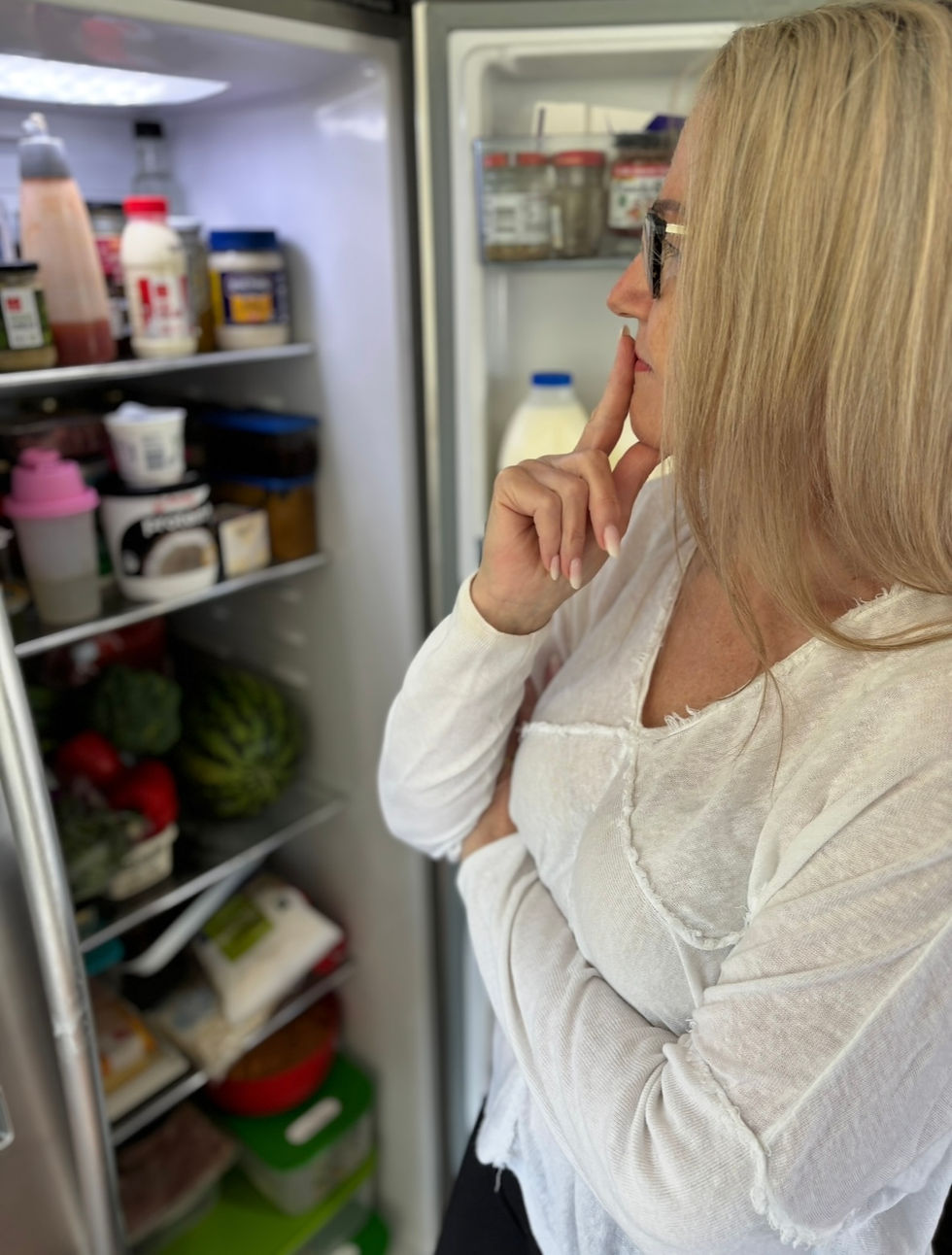Self-Sabotage Isn’t What You Think It Is
- Sonia McIndoe

- Aug 4, 2025
- 6 min read
Updated: Aug 5, 2025
For years, I thought my biggest problem was that I couldn’t stick to a plan.

I’d start the day with the best of intentions - healthy breakfast, protein-packed lunch, walking shoes by the door and yet, I’d find myself in the kitchen at 9:30pm, at the bottom of a packet of biscuits. Again.
Cue the shame spiral: “What’s wrong with me? Why do I always ruin things?”
But what if I told you that this pattern, the late-night snacking, the mindless munching, the “I’ve already blown it” binge - isn’t you being lazy, weak, or undisciplined?
What if it’s actually self-protection in disguise?
The Hidden Purpose of Self-Sabotage
We throw the word “self-sabotage” around like it’s a character flaw. But here’s the truth I’ve come to learn, for myself, and for those I coach:
Self sabotage is just your nervous system doing its best to keep you safe.
That handful of biscuits. That late-night toast. That constant loop of “start again Monday.” These aren’t signs of failure. They’re signals. They’re your body’s way of saying, “I’m overwhelmed. I need relief. I don’t know what else to do.”
Because behind most food struggles isn’t a lack of willpower; it’s a nervous system stuck in survival mode. It’s your brain leaning on the quickest way to get a dopamine hit. And food, especially hyperpalatable food, lights up your reward circuitry like a Christmas tree!
What’s Really Happening Inside You - The Neuroscience of “Sabotage”
When you eat for comfort, connection, or to take the edge off, you’re not imagining the relief you feel. Your brain is flooded with dopamine, the feel-good chemical that comes with reward.
Add to that the role of ghrelin, the “hunger hormone,” which spikes under stress and restriction. It doesn’t just increase physical hunger; it intensifies emotional hunger, too, making you crave the very foods you’re trying to avoid.
And don’t forget the ‘endocannabinoid system’, the same one activated by cannabis. It responds to rich, rewarding foods with a sense of pleasure and calm. Your biology is literally wired to reach for something when life feels heavy.
This isn’t sabotage. This is survival. But it’s outdated wiring, an old system that learned to numb and soothe rather than process and regulate.

" Let’s clear something up: not all emotional eating is bad."
You’re allowed to enjoy food. You’re allowed to eat for pleasure. In fact, research shows that pleasure-driven eating, when done with awareness, actually supports better food choices, portion control, and long-term wellbeing.
Self-Control vs Self-Regulation
Here’s something I wish everyone on a weight loss journey was taught:
Self-control is temporary. Self-regulation is transformational. Self-control says, “Don’t eat that.” Self-regulation says, “Let’s get curious. What do I really need right now?”
Self-control relies on willpower, and willpower is like a battery it drains quickly, and it’s completely unavailable when you’re stressed. But self-regulation is a skill. It’s about understanding your patterns, tuning into your body, and meeting your needs before you end up in the kitchen looking for answers in the fridge.
This is the work I do with my clients - shifting from punishment to parenting. From restriction to regulation.
Building Emotional Tolerance
Let's talk about why that moment before the binge feels so hard to interrupt. It’s because no one taught us how to sit with discomfort. We were handed food, distractions, or avoidance, never stillness. Never safety in the storm.
But this is where true power lies: in learning emotional tolerance. The ability to feel uncomfortable feelings, loneliness, shame, boredom, frustration, and not immediately act on them.
To say:
“I feel this… and I can hold this.”
“I’m not broken - I’m just having a moment.”
Over time, this rewires your nervous system. You don’t need to numb or buffer with food, because you’ve built the internal strength to feel without fear.
Limiting Beliefs: The Invisible Saboteurs
Underneath all of this is a quiet, stubborn voice, one you may not even notice.
“I can’t be trusted around food.”
“Once I start, I won’t stop.”
“I’ll always struggle.”
“I always regain”
These are limiting beliefs - subconscious stories that drive your behaviours without your consent. They’re often inherited or shaped by past trauma, diet culture, or family dynamics. And they feed the cycle of sabotage by making you believe you’re powerless.
But here’s the thing: beliefs can be rewritten. When you see the pattern, you can break it. When you name the fear, you take away its power.
This is the deeper mindset work. And it’s where real change begins.
The Truth About Food and Pleasure

Food is not the enemy. Pleasure is not the problem. Disconnection is.
When you eat with presence, when you savour, enjoy, and choose food as one of many forms of joy - it’s empowering. But when you eat to escape, numb, or ignore what’s really going on, it becomes a trap.
The goal is not to eliminate your cravings. It’s to reconnect with your body, your emotions, and your needs so food can go back to being just food again. You’re Not Failing - You’re Learning If you’ve ever thought, “I know what to do, I just don’t do it,” please hear this:
That gap between knowing and doing?
That’s where your old patterns meet your new intentions.
It’s not failure. It’s a place for compassion, not criticism.
You’re not broken. You’re brilliantly wired for safety. Your habits made sense. Your cravings had purpose.
Now, you get to choose differently, not through force, but through understanding.
Teaching & supporting you to do this is my job, and my friend, it is where the real freedom begins.
Join me for a free webinar!
So, I’ll leave you with a warm invitation to my 8 Fundamentals FREE webinar where I share my daily to-do list and how I actually manage my bariatric journey day by day.
It’s in an ‘hour of power’ where I squeeze a lot of valuable information for you into the 60 minutes on Zoom - totally for free.
Ready for more? Let's do the "Groundwork" together. This is small group coaching via Zoom, so you can join from anywhere in New Zealand.
About Sonia McIndoe

Hi! I'm Sonia, a NZ Bariatric Life Coach, who has had weight loss surgery and maintained a 70kg weight loss over more than nine years. I walk the walk and have dealt with my own regain by continuing to use and hone my own fundamentals and strategies which I share with you. Like you, I struggled with my weight...

I actually struggled with it my entire life. At 5 years of age my ballet teacher told me “I danced like a baby elephant”. I yo-yo dieted my way to a body I loathed and had given up on. Food was my friend - but it was a love/hate relationship. In many ways it saved me, but it was also slowly killing me.
I wasn’t convinced even Weight Loss Surgery would work for me … why would it when nothing else had!
10 years post Weight Loss Surgery later and still several dress sizes smaller, I am the happiest I have ever been.

You can have the success you dream of too. I am so passionate about sharing how, that I work full time as a Bariatric Coach.
I credit my Weight Loss Surgery with my 70kg weight loss, but keeping it off, I credit to doing the mind work. It’s this mind work that I teach in my Mind Empowerment coaching programmes.

The Mind Empowerment Programme
Sonia McIndoe's coaching programme is called Mind Empowerment and starts with a free one hour webinar, "The 8 Fundamentals for Bariatric Success".
The next stage is group coaching by Zoom to do the "Groundwork", followed by "Mind Empowerment".
One on one individual coaching is also available. Sonia coaches live via Zoom, so you can be anywhere in New Zealand and access help from her as your weight loss coach.
Find out more at www.mindempowerment.co.nz



